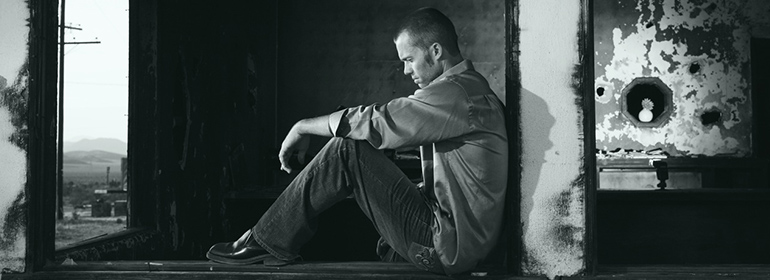My eating disorder was a demon that ravaged me both mentally and physically and it was a result of my internalised homophobia, says David Carrie
In one medium Granny Smith apple there are 80 calories, zero grams of protein and 22 grams of carbohydrate, of which five grams are dietary fibre and the remaining grams, are sugar.
It’s entirely likely that you, as a reader, will never have looked so closely into the specific macronutrients of a lowly Granny Smith, nor would you ever consider this titbit of trivia to be of importance. In the mind of somebody suffering from an eating disorder such as anorexia nervosa, however, these figures make all the difference. As food becomes more and more the enemy, these figures become a distorted justification.

My own personal dalliance with bulimia nervosa lasted for almost two years, between the ages of 20 and 22. Since then there have been at least four occasions in which my eating disorder has reared its head again. As a man who’s suffered from bulimia nervosa, I’ve found that people do not want to discuss it – it is most definitely a taboo subject. The website nationaleatingdisorders.org states that “approximately 80% of bulimia nervosa patients are female,” which means that one fifth of all bulimia nervosa patients are men, but men with eating disorders are very often overlooked.
Sunday Dinner
Picture it. You’re at a dinner table on a winter’s Sunday evening with your family discussing the weekend’s events. As each morsel passes through your lips, your thoughts become distant yet obsessive all the same. Calories and grams of carbohydrate and fat suddenly coalesce in your psyche as demons that lay waste to your self-esteem and confidence. Your thoughts spiral towards redemption, to ridding yourself of these demons. You drink a glass of water, and another, and another, and another, and then you excuse yourself. Your stomach feels like it could burst.
You go to your parent’s ensuite. The family bathroom is too close to the dining room and your wretches might be heard. Once you’re contented with the fact that the tap running beside you is enough to muffle the noises you’ll make, you engage in behaviour that is both disturbing and reassuring. You feel a light-headed elation that is instantly swapped with a burning sensation from the stomach acid that’s just surfaced. Your eyes are watering and you can’t tell if you’re crying or not. You’ve purged yourself, but the demon you face is not the food you’ve just consumed; it is bulimia and you’ve just strengthened it tenfold. You flush the toilet and say a silent prayer to whoever you can that all the remains will vanish in one go.
This is a common event in the cycle that bulimia nervosa can become. You promise yourself that you’ll eat healthily again tomorrow, and that you can go one day without purging, but the next day, you find yourself at the mercy of the demon once more.
Internalised Homophobia
My issues with food were about a need to be in control. If I could control what I could put into my body, and purge it back out, I was afforded some tiny, momentary catharsis. As a gay man growing up in a small, rural, typically Irish town, I’d always felt subjected to the prejudices of those who didn’t quite understand the notion of being gay. I grew to hate who I was, to want to be in control of what people might see in me. Looking back, I can see that my own outlook was causing me more harm than what I perceived other people to be thinking of me.
Bulimia nervosa ravaged me both mentally and physically, shattering my confidence and destroying my metabolism. It caused me to develop a heart murmur, which I’m happy to say is the extent of the physical damages. Others are not so lucky.
I’m still haunted by the ghost of my eating disorder. It remains as a daily reminder of the time I lost and the part of me I sacrificed. I think back to all the conversations and connections I missed out on because I wasn’t fully present, my mind being elsewhere, planning my next binge and how I would purge myself of what I’d consume.
It was incredibly difficult to speak about my suffering; reaching out for help takes strength that not everyone can muster. We need more support services for men who suffer from eating disorders, and we need more body acceptance, particularly on the gay scene. Without taking away from the plight of female sufferers, we need to lift the taboo on eating disorders and the men who suffer from them.
The website bodywhys.ie provides online resources to help people with eating disorders, including group chat sessions in which you can be anonymous and speak to other people suffering with eating disorders in a safe environment.
© 2016 GCN (Gay Community News). All rights reserved.

comments. Please sign in to comment.